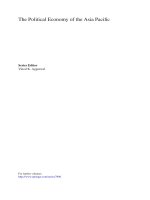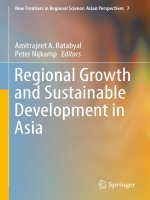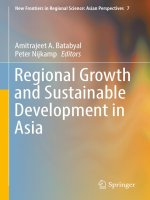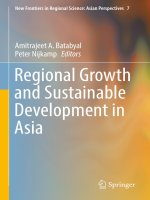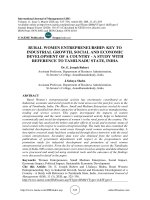Economic growth and economic development 519
Bạn đang xem bản rút gọn của tài liệu. Xem và tải ngay bản đầy đủ của tài liệu tại đây (74.03 KB, 1 trang )
CHAPTER 11
First-Generation Models of Endogenous Growth
The models presented so far focused on physical and human capital accumulation. Economic growth is generated by exogenous technological progress. While
such models are useful in thinking about sources of income differences among countries that have (free) access to the same set of technologies, they do not generate
sustained long-run growth (of the country or of the world economy) and have relatively little to say about sources of technology differences. A full analysis of both
cross-country income differences and the process of world economic growth requires
models in which technology choices and technological progress are endogenized. This
will be the topic of the next part of the book. While models in which technology
evolves as a result of firms’ and workers’ decisions are most attractive in this regard, sustained economic growth is possible in the neoclassical model as well. We
end this part of the book by investigating sustained endogenous economic growth
in neoclassical or quasi-neoclassical models.
We have already encountered the AK model in Chapter 2. This model relaxed
one of the key assumptions on the aggregate production function of the economy
(Assumption 2) and prevented diminishing returns to capital. Consequently, continuous capital accumulation could act as the engine of sustained economic growth.
In this chapter we start with a neoclassical version of the AK model, which not
only shows the possibility of endogenous growth in the neoclassical growth model,
but also provides us with a very tractable model that find applications in many
areas. This model is not without shortcomings, however. The most major one is
that capital is the only (or essentially the only) factor of production, and asymptotically, the share of national income accruing to capital tends to 1. This, however,
is not an essential feature of neoclassical endogenous growth models. We present
two different two-sector endogenous growth models, which behave very similarly to
505



